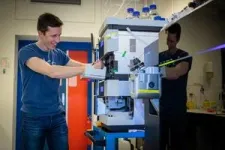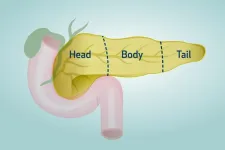(Press-News.org) Patients with rheumatoid arthritis (RA) all have a unique and diverse set of antibodies that are involved in the development of the disease. Researchers at Utrecht University unveiled the complexity of these antibodies using powerful lab tools capable of analysing our immune system at molecular levels. Their discovery suggests that current assumptions about the origin of RA are too simple. Still, their findings may point towards improved diagnostics.
Rheumatoid arthritis is a chronic autoimmune disease that primarily affects the joints, causing pain, stiffness, and swelling. It arises when the immune system mistakenly attacks the body’s own tissues, leading to inflammation in the joints and potentially other organs.
The exact cause of RA remains unknown, but a crucial role is played by antibodies, special proteins made by the immune system to help fight off infections. They recognize and attack specific targets, like viruses or bacteria. Some antibodies are wrongly produced, causing them to attack our own body. Normally, our body’s immune system is equipped with a ‘filter’ that cleans up these so-called autoantibodies. Researchers believe that this mechanism is malfunctioning in RA patients.
Extremely broad variety
The extend to which this filter is malfunctioning, now appears to be much greater than expected. Research by Albert Bondt and colleagues from Utrecht University and Leiden University Medical Center (LUMC), published in Nature Communications, reveals that it’s not just a handful of different RA-associated autoantibodies that evade the filter. On the contrary, the researchers found an extremely broad variety of these antibodies.
Unique and diverse
The team used novel mass spectrometry tools that profile specific antibodies typically seen in the blood of RA patients, which are called anti-citrullinated protein antibodies (ACPAs). They discovered that each RA patient possesses a unique and diverse set of ACPAs. Their findings challenge previous assumptions about the backgrounds of RA, that overlooked the antibodies’ diversity and complexity. “This shows that RA is not just a disease occurring due to small errors, but a big structural problem in the immune system”, says Bondt.
More sugar molecules
The study also revealed that these ACPAs are extensively modified with sugar molecules, known as Fab glycans. Intriguingly, some antibodies had multiple sugar molecules attached. This is much more then researchers normally observe in antibody profiles.
Having extra glycans aboard, may help the ACPA antibodies pass the filter of the immune system, says Bondt. The immune system uses several very strict checks during antibody production, to make sure all antibodies are correct. Wrongly produced antibodies are then detected and removed. Bondt suspects that glycans could help ACPAs trick the control system, allowing ACPAs to pass through the filter and form the onset of RA.
Different approaches for treatment
Current efforts to develop treatments for RA are mainly geared towards eliminating autoantibodies directly. This strategy may not be effective, says Bondt. “When you realize that there is such an extreme diversity in RA-related autoantibodies, it seems virtually impossible to eliminate them. A better approach may be to intervene earlier in the disease process, by targeting the malfunctioning filtering mechanism that allows autoantibodies to pass through.”
Understanding these unique proteins is important, as it could ultimately also help doctors diagnose RA better. “When more molecular details about RA-related antibodies are uncovered, the disease may be diagnosed in an earlier stage”, says Bondt. “Even though RA remains an incurable disease, with an earlier diagnosis you can take better measures to control its progression.”
END
Patients with rheumatoid arthritis have unique and complex autoantibody patterns
Research challenges therapeutic approaches and assumptions about biomolecular backgrounds
2024-05-01
ELSE PRESS RELEASES FROM THIS DATE:
Keck Hospital of USC earns an ‘A’ hospital safety grade from The Leapfrog Group
2024-05-01
LOS ANGELES — Keck Hospital of USC earned an “A” Hospital Safety Grade from The Leapfrog Group, an independent national watchdog organization.
“This grade puts Keck Hospital among the safest in the nation, and is a testament to the hospital’s commitment to the highest standards of quality and safety protocols,” said Marty Sargeant, MBA, CEO of Keck Medical Center of USC.
The Leapfrog Group assigns an “A,” “B,” “C,” “D” or “F” grade to general hospitals across the country based on over 30 measures of errors, accidents, injuries and infections and the ...
Survey finds young adults more likely to believe myths about sun protection and skin cancer prevention
2024-05-01
Orlando, Fla - A new national survey by the Orlando Health Cancer Institute finds nearly a third (32%) of Americans agree that a tan makes people look better and healthier, a dangerous beauty standard that experts say can lead to risky behavior when it comes to sun exposure.
“There is no such thing as a healthy tan, as it’s really just a visual manifestation of damage to the skin,” said Rajesh Nair, MD, an oncology surgeon at the Orlando Health Cancer Institute. “But we’re fighting against a perceived positive image and health benefits of something that actually has a totally opposite reality, which ...
Time zones and tiredness strongly influence NBA results, study of 25,000 matches shows
2024-05-01
The body clock has a significant impact on the performance of NBA players, according to study published in the peer-reviewed journal Chronobiology International.
The authors say their findings, from more than 25,000 matches, show elite basketball coaches and teams should consider the physical and mental effects of time zone travel when planning games and preparing for games.
A first of its kind, the research is based on the achievements at home and away of NBA (National Basketball Association) league players across 21 consecutive seasons. Considered the most competitive in the world, NBA athletes frequently travel ...
Premature menopause linked to increased musculoskeletal pain and likelihood of sarcopenia
2024-05-01
CLEVELAND, Ohio (May 1, 2024)—Musculoskeletal pain is a prevalent menopause symptom, which helps explain why women typically experience more pain than men, especially around the age of 50 years. Beyond pain, muscle function and mass are also affected by menopause. A new study suggests premature surgical menopause can lead to an increased risk of muscle disorders. Results of the survey are published online today in Menopause, the journal of The Menopause Society.
The highly publicized Study of Women’s Health Across the Nation spotlighted a number of symptoms that are common during the menopause ...
Women are 40% more likely to experience depression during the perimenopause
2024-05-01
Women are 40% more likely to experience depression in the perimenopause than those who aren’t experiencing any menopausal symptoms, finds a new study led by UCL researchers.
The research, published in the Journal of Affective Disorders, provided a meta-analysis of seven studies involving 9,141 women from across the world (including Australia, USA, China, Netherlands and Switzerland), to understand whether different stages of the menopause were associated with different risk of depression.
The perimenopause usually occurs around three to five years before the onset of menopause. During this stage women’s oestrogen and progesterone levels begin to fluctuate, ...
World’s highest observatory explores the universe
2024-05-01
How do planets form? How do galaxies evolve? And ultimately, how did the universe itself begin? A unique astronomical observatory that researchers hope will unravel some of the biggest mysteries out there marks its opening on April 30, 2024.
At an altitude of 5,640 meters, the University of Tokyo Atacama Observatory (TAO), built on the summit of a desert mountain in northern Chile, is the highest astronomical observatory in the world, which should give it unrivaled capabilities, but presents some novel challenges.
Astronomers will ...
$27 million to map 50 million human cells and uncover genetic fingerprints of disease
2024-05-01
Illumina, a global genomics and human health company, has partnered with the Garvan Institute of Medical Research’s TenK10K project to help transform the treatment of complex diseases, starting with autoimmune diseases, with a joint investment of $27 million AUD.
The Garvan Institute plans to map 50 million human cells from 10,000 people to identify unique genomic fingerprints of autoimmune diseases, heart diseases and cancer, building on the early success of a clinical trial for Crohn’s disease.
Crohn’s disease affects more than 80,000 Australians. As with many autoimmune diseases, ...
Validated rules help prevent overuse of CT scans for diagnosing traumatic head and abdominal injuries in kids
2024-05-01
Head and abdominal trauma is a leading cause of death for children. About 1%–2% of children who come to emergency departments with head or abdominal injuries require immediate intervention. These injuries are diagnosed the world over by computed tomography (CT) scans. But CT-related radiation can cause cancers later in life, and accumulated evidence suggests that CT is overused.
“There is an urgent need for validated guidelines for the safe use of CT to diagnose injured children while preventing unnecessary radiation exposure,” says Pradip Chaudhari, MD, Director of Research and Scholarship, Division of Emergency and Transport Medicine, ...
Closing the U.S./Mexico border during COVID-19 increased HIV transmission
2024-05-01
The border crossing separating San Diego, California, from Tijuana, Mexico, is a dynamic place. When it was closed during the COVID-19 pandemic, drug tourism from San Diego to Tijuana continued. This provided a flow of people in both directions, bringing with them not only the virus that causes COVID-19 (SARS-CoV2) but also the virus that causes AIDS (HIV). A collaborative study led by researchers from University of California San Diego and Irvine, recently published in the Lancet, found that rather than preventing the spread of disease, closing the border actually increased the rate of HIV transmission.
Injection drug use increases the risk of HIV infection through ...
Researchers at Houston Methodist find difference in pancreatic cancer cells, offering new hope for immunotherapy effectiveness
2024-05-01
A new study has found that pancreatic cancer cells are different based on their location in the pancreas, providing new information about tumors that could lead to better targeted treatments.
Pancreatic ductal adenocarcinoma (PDAC) is an aggressive cancer, and the diagnosis has dramatically increased over the last decade. It is currently the seventh leading cause of cancer deaths in men and women globally and projected to be the third leading cause of cancer-related deaths world-wide by 2030. This increase is due to several factors such as an increase in obesity and diabetes.
Houston Methodist’s ...
LAST 30 PRESS RELEASES:
Scientists show how to predict world’s deadly scorpion hotspots
ASU researchers to lead AAAS panel on water insecurity in the United States
ASU professor Anne Stone to present at AAAS Conference in Phoenix on ancient origins of modern disease
Proposals for exploring viruses and skin as the next experimental quantum frontiers share US$30,000 science award
ASU researchers showcase scalable tech solutions for older adults living alone with cognitive decline at AAAS 2026
Scientists identify smooth regional trends in fruit fly survival strategies
Antipathy toward snakes? Your parents likely talked you into that at an early age
Sylvester Cancer Tip Sheet for Feb. 2026
Online exposure to medical misinformation concentrated among older adults
Telehealth improves access to genetic services for adult survivors of childhood cancers
Outdated mortality benchmarks risk missing early signs of famine and delay recognizing mass starvation
Newly discovered bacterium converts carbon dioxide into chemicals using electricity
Flipping and reversing mini-proteins could improve disease treatment
Scientists reveal major hidden source of atmospheric nitrogen pollution in fragile lake basin
Biochar emerges as a powerful tool for soil carbon neutrality and climate mitigation
Tiny cell messengers show big promise for safer protein and gene delivery
AMS releases statement regarding the decision to rescind EPA’s 2009 Endangerment Finding
Parents’ alcohol and drug use influences their children’s consumption, research shows
Modular assembly of chiral nitrogen-bridged rings achieved by palladium-catalyzed diastereoselective and enantioselective cascade cyclization reactions
Promoting civic engagement
AMS Science Preview: Hurricane slowdown, school snow days
Deforestation in the Amazon raises the surface temperature by 3 °C during the dry season
Model more accurately maps the impact of frost on corn crops
How did humans develop sharp vision? Lab-grown retinas show likely answer
Sour grapes? Taste, experience of sour foods depends on individual consumer
At AAAS, professor Krystal Tsosie argues the future of science must be Indigenous-led
From the lab to the living room: Decoding Parkinson’s patients movements in the real world
Research advances in porous materials, as highlighted in the 2025 Nobel Prize in Chemistry
Sally C. Morton, executive vice president of ASU Knowledge Enterprise, presents a bold and practical framework for moving research from discovery to real-world impact
Biochemical parameters in patients with diabetic nephropathy versus individuals with diabetes alone, non-diabetic nephropathy, and healthy controls
[Press-News.org] Patients with rheumatoid arthritis have unique and complex autoantibody patternsResearch challenges therapeutic approaches and assumptions about biomolecular backgrounds








